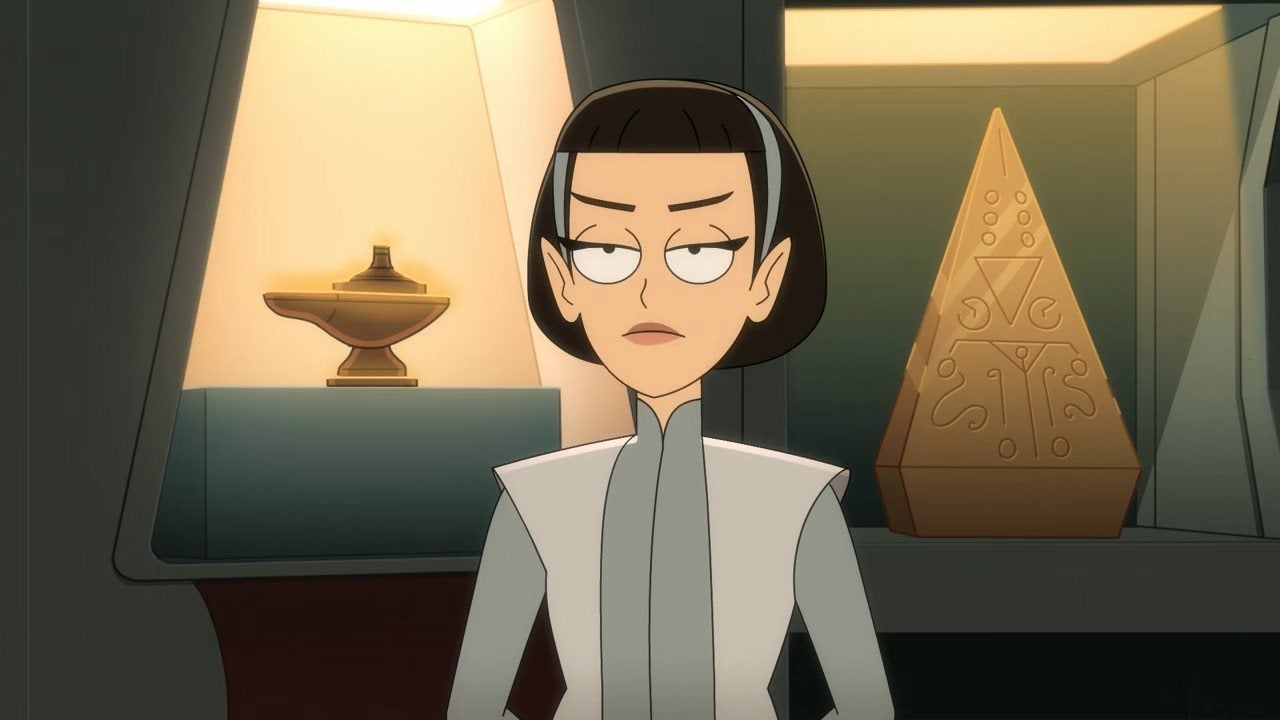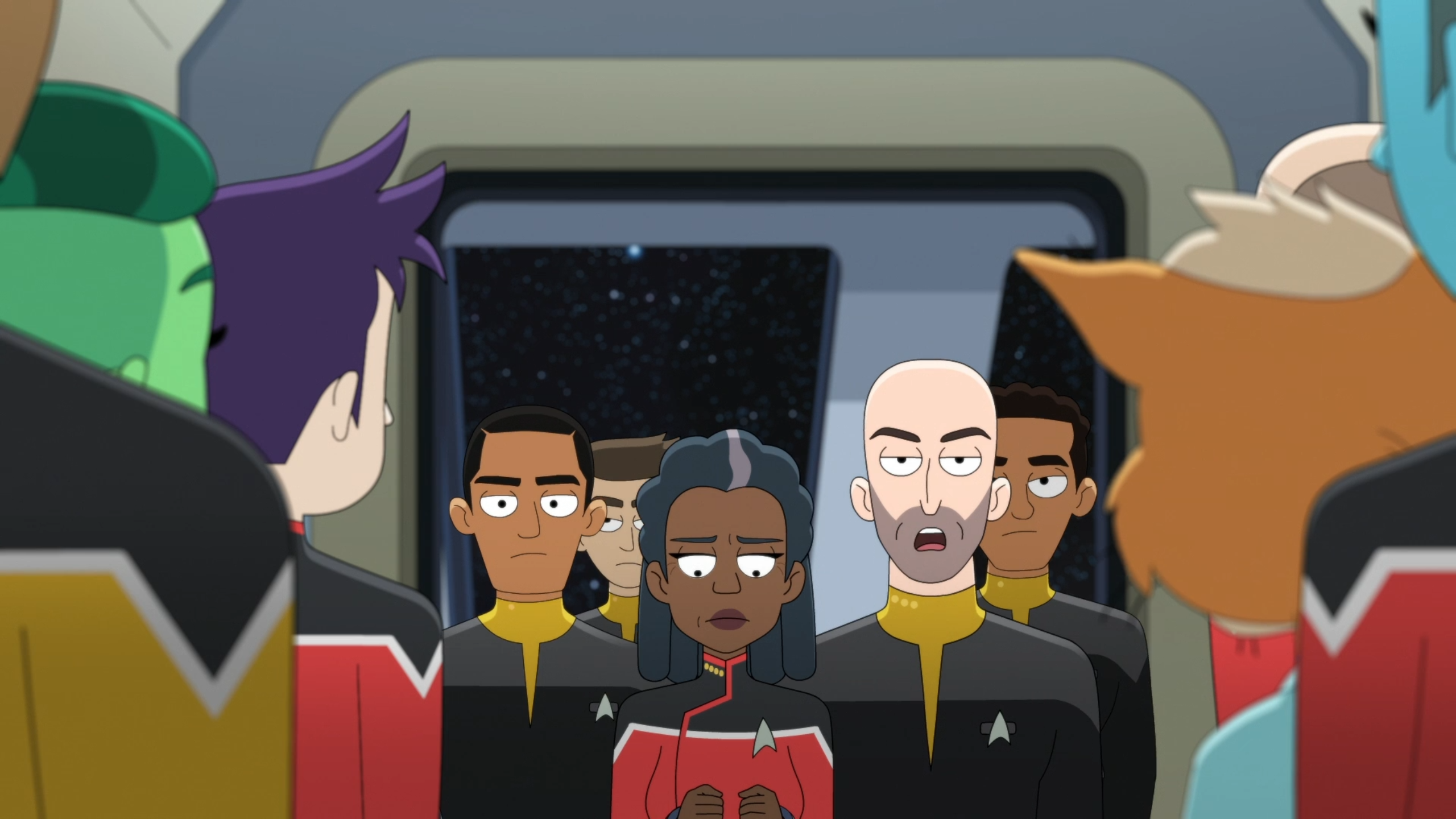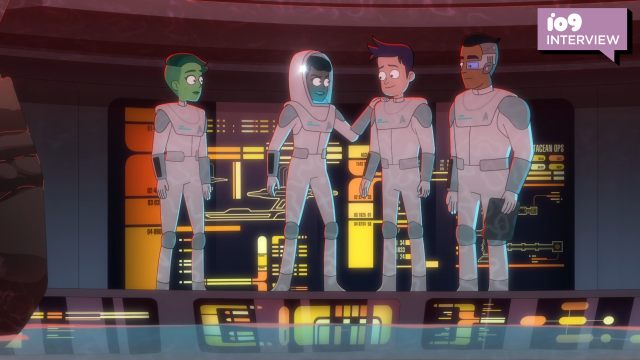Another season of Star Trek: Lower Decks has come to an end, but this time, the show has evolved into a whole new level of trials and tribulations for the crew of the Cerritos. To look back on season two and unpack some of those twists from the finale, Gizmodo chatted with showrunner Mike McMahan to uncover what to expect from the show’s next adventures.

After a season with the underlying theme of our characters learning to trust each other — and more specifically put the best version of themselves in each other’s hands when their backs were against the wall — Lower Decks’ second season finale, “First First Contact,” put that lesson to the ultimate test. In an action-packed, high-stakes disaster unlike anything we’ve seen on the show before, Ensigns Boimler, Mariner, Tendi, and Rutherford (and the whole damn Cerritos crew) were pushed to the limit. While they may have gotten out of it with the day saved, it was clear by the time that “To be Continued…” card rolled, they weren’t done fighting. To learn more about the lessons learned across Lower Decks’ second season, highlights of one of McMahan’s favourite episodes of the show so far, and what the shocks of the season finale will mean for Boimler, Mariner, Tendi, and Rutherford going forward, check out our full interview — conducted over video — with the showrunner below.
James Whitbrook, Gizmodo: When we came back into season two, there’s a bit of a reset with the characters — we get the teleporter clone of Boimler, we get Tendi and Rutherford sussing through Rutherford’s memory loss from the end of last season… can you talk about the intent of re-centering these characters after we blew them apart figuratively and in some cases literally, at the end of the first season?
Mike McMahan: Lower Decks is really about these four ensigns, right? It’s a long-form story that I’d planned out and had really, emotionally planned out… I have a lot of episodes that are finding out, and building to, those moments. I think we’ll see there’s a couple things [that] Lower Decks fans will come to understand — which is, you won’t be able to predict what you’re going to get, and that we seem like we’re having a blast while we’re making it. Now, I never want people to feel betrayed or there was a bait-and-switch… but a headline for me on Lower Decks is… there’s a great kind of dissolution of it: the episode where Rutherford doesn’t get to know why Shaxs came back, and the reasoning behind that is there’s eight-hundred and something episodes of Star Trek — it’s all been done. Weirdly, not an episode on a Klingon ship and a Vulcan ship, that we did — I couldn’t believe hadn’t been done, but we got to do it!
But these big dramatic things, these serialized things, these things that change the show drastically… if we lean onto that stuff, we’d very quickly get into a roundabout of bumping into stuff that Deep Space Nine did, Discovery did, that Enterprise did. So, what I like to play with is how do we have characters experience and change because of these big things that maybe change who they are — and where they are for three episodes — as opposed to seasons and forever? Then have them come back to the main family, the crew of the show, and then don’t forget the experience — don’t forget that they went through this — but don’t have it change the show in order to service the storyline, where lots and lots of stories can happen… and not where we get into a bottleneck where it all becomes one story.
io9: This season we had the traditional Boimler/Mariner, Tendi/Rutherford pairings get mashed up more often — is that something we’ll get to see more of moving forward?
McMahan: It’s so funny because we wrote the season before you guys saw season one, and we sat down and it was like… well, I’ll tell you right now. Having just watched all the cuts of season one, I was like, “We never got to see Tendi and Mariner! They’re my favourite characters. What did we do!?” It’s one of those things where there’s so many things in your head you’re trying to figure out, and you step back and you’re like, “Gah, there’s something right there the whole time that would have made my life easier.” The episode where we pair up Tendi and Mariner was explicitly a blast to write. So yeah, not only are you going to be seeing different pairings, but you’re going to seeing them because of weird things that happen. For instance, Tendi going into senior science officer training [in the finale]? That is going to be taking her on stories that nobody can come with her on. It’s like a friend getting to medical school, or something. When one of my friends went to medical school and we’d all get together and have dinner, I’d be telling stories about being a production assistant, and he’d be telling stories about holding a human heart. There’s some things you can’t go with your friends to do. So, more than pairings you don’t usually see as much, you’re going to see stories that really highlight our lower deckers on their own while still coming together as friends.

io9: Before we get into the finale, I wanted to talk about “wej Duj.” Can you talk to me about the ideation process, and how you got to the simple, but great idea of “What if we just followed three ships?”
McMahan: Part of it is that season one, I loved [episodes] nine and ten being the finale. I like ending a season on big, unexpected, form-defying but still necessary episodes. When we sat down to figure out what we were going to do [for season two], we’d just done our sketch comedy episode — I was like, “OK, the audience has been with us for 18 episodes. They’ve got this far. Let’s give them something they’ve never seen before, more lower decks than ever before.” We also had the word “cinematic” in our head for the last couple episodes — what feels like a push of our own form, as well, and the idea that I knew that I wanted to experience lower deckers in other ships in the Federation. Pretty quickly, we got to the point where it was like “Klingons and Vulcans, that’s the patron saints, right?” Those are two of the biggest, most seen, but surprisingly not… you can still dig into them. You have Ma’ah on his ship being a bit of a Boimler analogue, and T’Lyn on her ship being a bit of a Mariner analogue. It was really the joy of talking about what are those ships and cultures like. That’s what got me really excited.
And then when I realised nobody had done a contained story on Vulcan ship in the history of Star Trek, it kind of blew me away. Because they had to have done that on Enterprise — it felt very Vulcan-heavy. And they really hadn’t. We cribbed some designs, but we had to create a ton of stuff just off the feeling of the Vulcan stuff we had heard about across the franchise. Then once we were writing it, I had to tie in the stuff with the Pakleds and … the Pakleds are these fascistic, stupid, “don’t take us lightly” force that we have. In the real world, there are always nefarious people bankrolling these guys behind the scenes for their own kind of nefarious purposes. It just felt so Star Trek VI to have that be what’s happening. It felt cool to me to be like, “Look — the Cerritos isn’t the most important ship in the fleet. How do we have them deal with an important, big thing without them really dealing with it?” Because you don’t want them to become the Enterprise, right? So, “Oh! Have a Boimler analogue on a Klingon ship be part of the lynchpin of saving the day, and have a Mariner analogue on her Vulcan ship be part of the lynchpin of saving the day, and involve the Cerritos. Then instead of the Cerritos, it’s the lower deckers, which is the theme of Lower Decks!” That’s when everything really locked in. It would be my dream to do a live-action movie version of that, in the Wrath of Khan/TOS era. New crews and just spend a bunch of time with Klingons and Vulcans and people in ‘70s-looking wigs and stuff. I’d geek out so hard. It’s like Hunt for Red October if there were two more subs.

io9: Moving on to the finale, I wanted to congratulate you on becoming a real Star Trek series by getting to end a season with a “To Be Continued…” placard!
McMahan: Thank you! Weirdly, it came it pretty late in the process where I was like “Why aren’t we doing that? It’s a cliffhanger.” And everyone was like, “Oh yeah.”
io9: That’s what I was going to ask — why did it matter specifically to you? We end the season with Captain Freeman brushing up against Starfleet security and the aftermath of that conflict in “wej Duj,” so why was it important specifically to draw that out into this kind of cliffhanger scenario?
McMahan: Well, “wej Duj” didn’t end. The Klingons leave and they’ve got a new boss, right? There’s obviously things that aren’t quite finished with that story which do get addressed in season three. So, I knew I wanted that. Also, we’re always trying to find these themes of finality, but also the story’s not over. So, so much stuff is wrapped up that, it really just felt like that story’s not over — and I don’t want people to wait until next season to know the story’s not over? So, the promise of the stuff they’re going to be seeing in season three is why the end on this. Also, I’ve had success with wrapping a story and beginning another story with the Titan in season one. I just like the imagination it sparks, to see how we handle it next season. Just wrapping it up with a bow feels too pat and I never liked that. This finale just gives you some heroes, and then takes away the person you believe in — that just got me really excited.
io9: Like the first season, this finale brings the focus back on Beckett and her mother Carol’s relationship — why was it important to centre the heart of this finale as well on giving them a little conflict between themselves?
McMahan: It was that moment [in the season two finale] where Mariner says something she’s always assumed, and she was wrong about, which is — [she and Captain Freeman are] in the Captain’s yacht — she says, “You always defend me because you know I’m a Kirk-style free spirit, and a badass and nobody else sees it.” And her mum is like, “No! I protect you because you need protection.” I think if Freeman had ever said this to Mariner in the first season, they’d never have this conversation, and the end of the first season does make Mariner look like a badass, Kirk-style free spirit who can solve any problem. But on the bridge in this episode, it’s beyond her. Mariner’s like, “I don’t know.” And it leads to this frustrating conversation [between her and Captain Freeman] where Freeman is like, “You need to stop thinking that you’re the ultimate badass and let people in.” Which is why when she rages on that, and her friends are like “Your mum is fucking right — don’t get us killed!” That’s a moment where Mariner is like, “Yeah. I do need to let people in.” You see this thematically with, like, Boimler being brave and jumping off on his own, you see Tendi having to go and believe in herself even though she thinks it’s going to be bad [with Dr. T’Ana], you see Rutherford have to delete his backup memories and trust that’s not going to have a deeply negative effect. Then in the very end, it’s Mariner saying to Jennifer [the Andorian], “I pushed you away this whole time, let’s date.” And we see them try that in season three. It felt like a nice change of course for something we’ve been seeding a long time [with her].

io9: Speaking of Jennifer, last year we danced around Mariner’s sexuality, and now getting to see that pay off here — was it important to have that as the emotional stake here for Beckett going into season three?
McMahan: In the third season, she and Jennifer are seeing each other and there are stories we tell about that. What I would say is it’s not easy to date Mariner, and this show really is not about Mariner’s romantic relationships. It’s about how she sees herself, and how she treats friends and colleagues more than romantic partners. So, it was important to me — from the point of view of Star Trek, having these people in your life and seeing where these stories go. Mariner’s sexuality to me has always been… she seems like the kind of character who can run into a villain and awkwardly Mariner had dated him or her before. Those are the kinds of stories I really get excited about. With Mariner, there’s these historical sort of things you see with her, so… you will see Mariner and Jennifer dating, and see how that affects her, but really the tectonic shift that’s going into [Mariner’s arc in season three] is, right when she opened herself up and everything was going great, it all gets taken away from her. How does that affect somebody who doesn’t like it when people leave her or are taken away?
io9: You have two seasons under your belt now, and a third on the way. What lesson did you take most to heart this season, having seen the reactions to season one, and how will it affect the next?
McMahan: All we’d seen people react to was season one as we wrote season three. Even that, we were kind of into season three when people started to see season one and talk about it, you know. But the thing that got me excited, as we start up [season three] there’s going to be some interesting cameos, some fun callbacks, but we’re also starting to mix in cameos and callbacks to our own episodes a little bit more. We’ve seen a lot of Mariner and Boimler and then Tendi and Rutherford, and we’ve seen them mixed up a bit. Season three we get to see them start their own paths a little bit more while still being friends. I think that’s fun stuff to write.
Star Trek: Lower Decks is now streaming on Amazon Prime Video.
Wondering where our RSS feed went? You can pick the new up one here.
